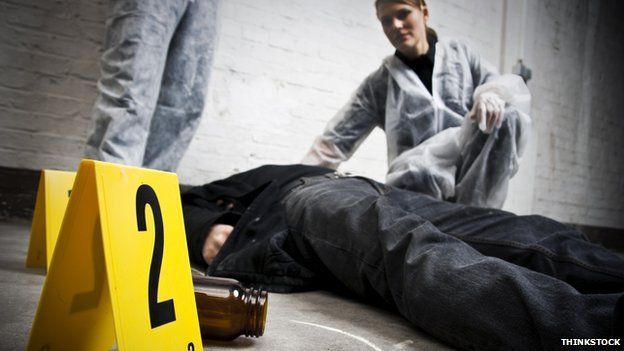Sherlock to CSI: Mystery writers seek science accuracy
- Published

Crime novels can be easily undone by faulty facts. While writers try to get the science straight, a leading US scientific organisation is now offering a seal of approval to books that do it right.
When Sherlock Holmes told Watson it was elementary, it really was - by modern sleuthing standards.
Today's crime fiction and thriller writers, on the other hand, face a minefield of science and technology that is often essential to the plot - but hard to describe accurately.
Now, the Washington Academy of Sciences (WAS), established in 1898 by Alexander Graham Bell, has introduced a seal of approval for books with the scientific facts straight. Unlike most peer-review processes, this one is open to mystery writers.
"So much junk science is being published," says Peg Kay, a writer and WAS member.
She blames commercial pressures and a lack of good editors for the decline.
"The editors now are just money men and they turn the editorial function over to an agent," she says. "All the agent is really interested in is the mass market. Nobody knows what to believe because there's no filter."
WAS President Jim Cole says many people encounter science through fiction and TV shows such as CSI, which can give the impression that technology can solve any crime.
"Science as it's generally perceived by the public is not necessarily correct science," he says.
"With self-publishing on the internet, I think this is going to be a huge issue in the future - about what's real and what's not real."
Most successful authors realise the importance of thorough research. They also write about what they know - or quickly make contact with people who can offer expertise.
"I worry constantly about getting it wrong," says New York Times bestselling author John Gilstrap.
"The more detailed one gets into the technical issues, the riskier it all becomes. A small phrase you get wrong and it's astonishing how many emails you get, with blistering speed, telling you how you got it wrong."
Gilstrap has written 11 thrillers, some featuring Jonathan Grave, a freelance hostage rescue specialist who bypasses the legal constraints hindering official efforts to reunite victims with their families.
While Sherlock Holmes followed footprints, Jonathan Grave uses mobile phone technology, GPS, and the digital trails left by credit cards to track his targets.
"I'm not a very technical guy," says Gilstrap. "The challenge for me was to sell Jonathan's knowledge of technology while not understanding a lot of it myself. The research I do is just enough to sell the notion that he can do what he does. I don't need to know how to do it myself."
That approach has been so successful that he has even fooled a military special operations source who mistakenly believed Gilstrap had divulged classified technical information in one of his novels.
"I made it up - I didn't reveal anything," says Gilstrap. "But the reality is, if there is a way to track somebody or kill somebody more efficiently, there is a top secret CIA development contract to get it done. It just turns out I hit this one on the head."
Most readers are familiar with the technology described in Gilstrap's books. But it is still fairly new as a plot device, says Kathy Harig, owner of Mystery Loves Company bookstore in Maryland.
She says the discovery of DNA was the first big scientific breakthrough that altered the way contemporary crime novels were structured. The most recent are the secret technologies employed in the international fight against terrorism.
"If you've got terrorism involved then you have to know about the whole military aspect," she says. "Drones, serial bombers, explosives, seeing things from a satellite."
Alexandra Hamlet, who won awards for her first novel, a Cold War thriller called The Right Guard, says terrorism has created a new fiction genre - and describes her own work as "intellectual suspense". She also draws extensively on her scientific background as an anthropologist and her work with US military intelligence.
That sort of background is increasingly essential to writing about contemporary events, Ms Harig says.
"No matter how timely it is - it had still better be right," she says.
Diane Davidson writes with her sister about the information technology industry in which they both worked. The heroine of their latest book, Outsourcing Murder, is a twenty-something IT consultant.
The Davidson sisters are currently developing a plot around the supposition that medical implants could be vulnerable to computer hacking.
"That's a prime example of a way to murder somebody," Diane Davidson says. "We're constructing a short story around that that is plausible but hopefully won't be a how-to manual for how to kill someone."
Scientists often disagree over real science. What happens when they cannot agree about the science and technology they read in fiction?
Ms Kay of WAS says the academy has been asked to approve a memoir by a well-known and highly respected neuroscientist.
"He practically invented neuroscience," she says. "We're not quite sure what to do about this, because if a reviewer comes back and says that on page 356 there's a mistake in the science, and he says no there isn't… what do we do?"
Four seals of approval have been conferred since the the group began offering the award in June. A fifth manuscript is currently under review.
And as the seal becomes more established, WAS members hope other writers will submit their work for scrutiny.
Whatever the obstacles and regardless of the science, new plots and twists continue to emerge.
And as Sherlock Holmes might have said: "Come Watson come - the game is afoot."